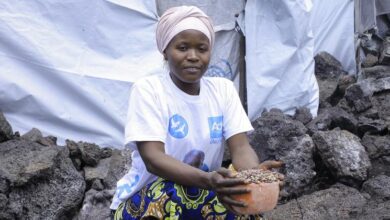Haiti’s ‘widespread crisis’ demands continued global attention: WFP
Waanja Kaaria, WFP The Representative and Country Director for Haiti, briefed journalists in New York along with the agency’s Regional Director for Latin America and the Caribbean, Lola Castro.
She cited the latest United Nations-backed Integrated Food Security Phase Classification (IPC). Analysis This shows that about 5.4 million people in Haiti, almost half the population, are suffering from severe hunger.
“This includes approximately 6,000 internally displaced persons (IDPs) sheltering in locations where we have also seen IPC5 pockets…the highest level, and this is also shown in famine-like conditions,” she said, speaking via video conference.
Young lives are in danger
Additionally, 270,000 children across the Caribbean country are severely malnourished.
She said: “We also know that hunger significantly increases the likelihood of engaging in adverse coping mechanisms and, especially acute for young people, is the risk of recruitment by armed groups and falling into crime”.
Armed gangs have been terrorizing Haiti for years, especially the capital Port-au-Prince, forcing people to flee their homes.
Ms. Kaaria reported that the recent increase in attacks has forced tens of thousands more people to flee their homes. The number has doubled in the past three months, bringing the total number of displaced people to more than 700,000.
Aid when attacked
In response to the crisis in Haiti, WFP is supporting vulnerable people, especially in the capital, and this work can be difficult.
On Thursday, a United Nations helicopter operated by the agency was hit by gunfire while leaving Port-au-Prince for Les Cayes but was able to land safely. An investigation is underway.
“The disruption is limited to today, as we suspend all flights today to allow time to assess the impact of the shooting. and allows us to establish additional routes for next week, while keeping an eye on the safety of our employees,” she said.
Meals and more
WFP has been responding to the crisis in Haiti by supporting vulnerable people, especially in the capital, including during the peak of violence earlier this year.
They have provided more than two million hot meals to more than 135,000 IDPs through partners on the ground. Food is prepared in local kitchens and some workers are also displaced. Meals are made from locally grown and produced ingredients.
Ms. Kaaria said she is always inspired when she visits kitchens, where cooking starts early in the morning so the food is ready to be served by noon.
“This ensures that displaced people across the capital can actually get at least one hot, nutritious meal a day.,” she said

Haitian children eat hot meals provided by the United Nations and partners at school.
Address the root causes of hunger
To date, WFP has assisted about 1.4 million people and aims to reach about 2.2 million by the end of the year. Support includes the distribution of cash transfers, with more than $31 million disbursed to date, along with more than 7,500 tons of food.
‘With the growing number of IDPs and the recent deportations of Haitians from the Dominican Republic, WFP continues to provide much-needed hot meals. to meet life-saving needs,” she said.
In addition to providing humanitarian assistance, WFP stands alongside the people of Haiti in addressing the underlying causes of hunger and ensuring long-term development.
In this regard, she pointed to the school meals program, implemented jointly with the Government, from which more than half a million children benefited. Approximately 70% of the ingredients used are produced and sourced locally.
Support local farmers
Each month and during the school year, WFP purchases approximately $1.7 million worth of goods from smallholder farmers, targeting more than 6,000 products this year alone from 150 farmer organizations.
“This is very important, especially because of it boost local economies and support local smallholder farmers and enable strong supply chain resilienceshe said.
WFP also works on social protection and has helped the Government create a database covering about 30% of the population.
This year, about 125,000 Haitians received cash transfers, giving them “the option to be able to purchase what they consider to be necessities to meet some of their basic needs, while also contribute to the local economy”.
Need more investment
Ms. Castro, WFP Regional Director, noted that the school meal program helps keep children in class and “creates some stability and normality.”
However, with 6,000 people facing catastrophic hunger, more needs to be done.
“Our priority is to save lives,” she said, speaking from Panama. “In addition, we need to continue to invest in areas where we can buy food, reduce malnutrition, and strengthen social protection systems and education systems.”
She recalls that humanitarian organizations launched one 642 million USD plan for Haiti, “but it’s only 42% funded, and we’re in October. So really, we need to do more and do better as an international community.”




